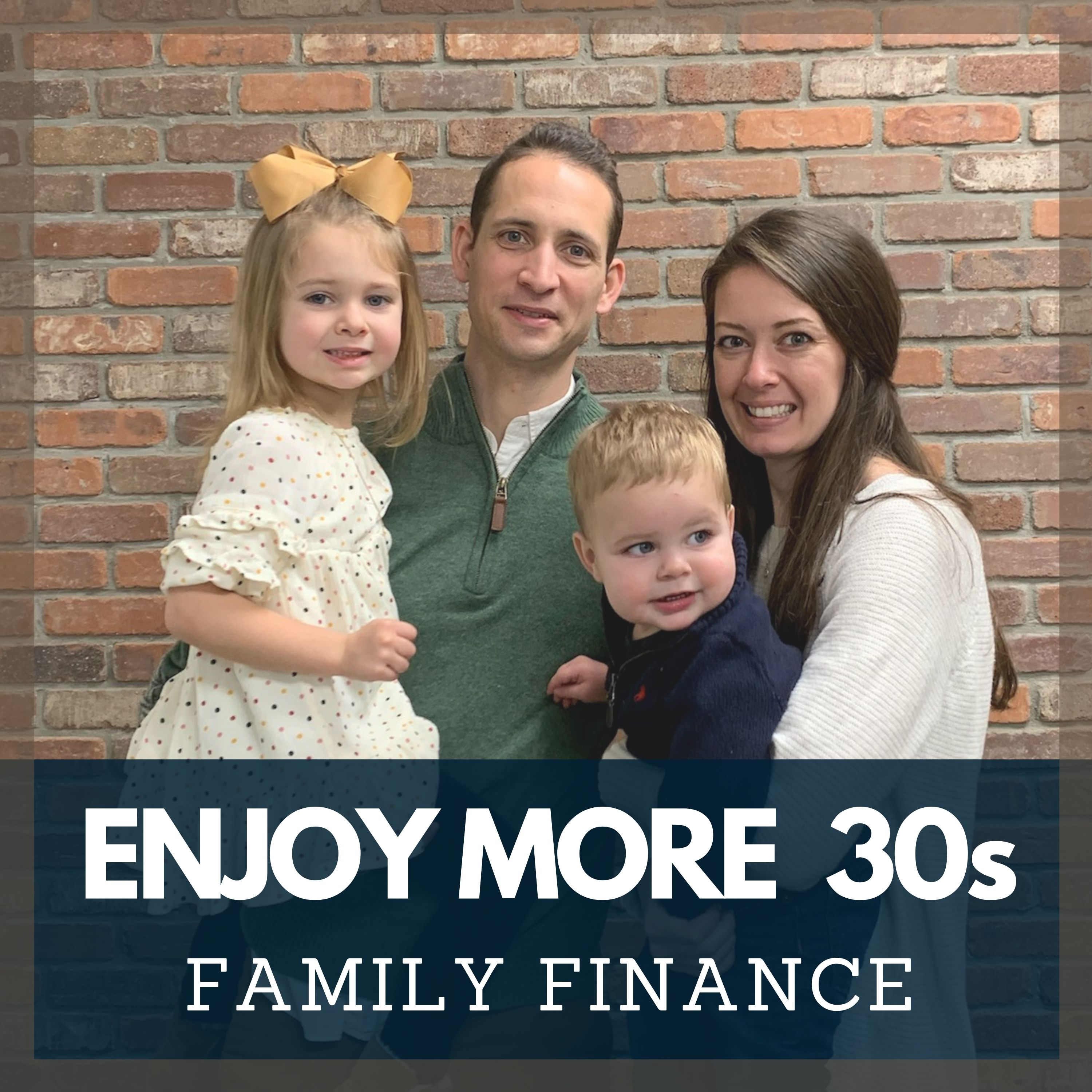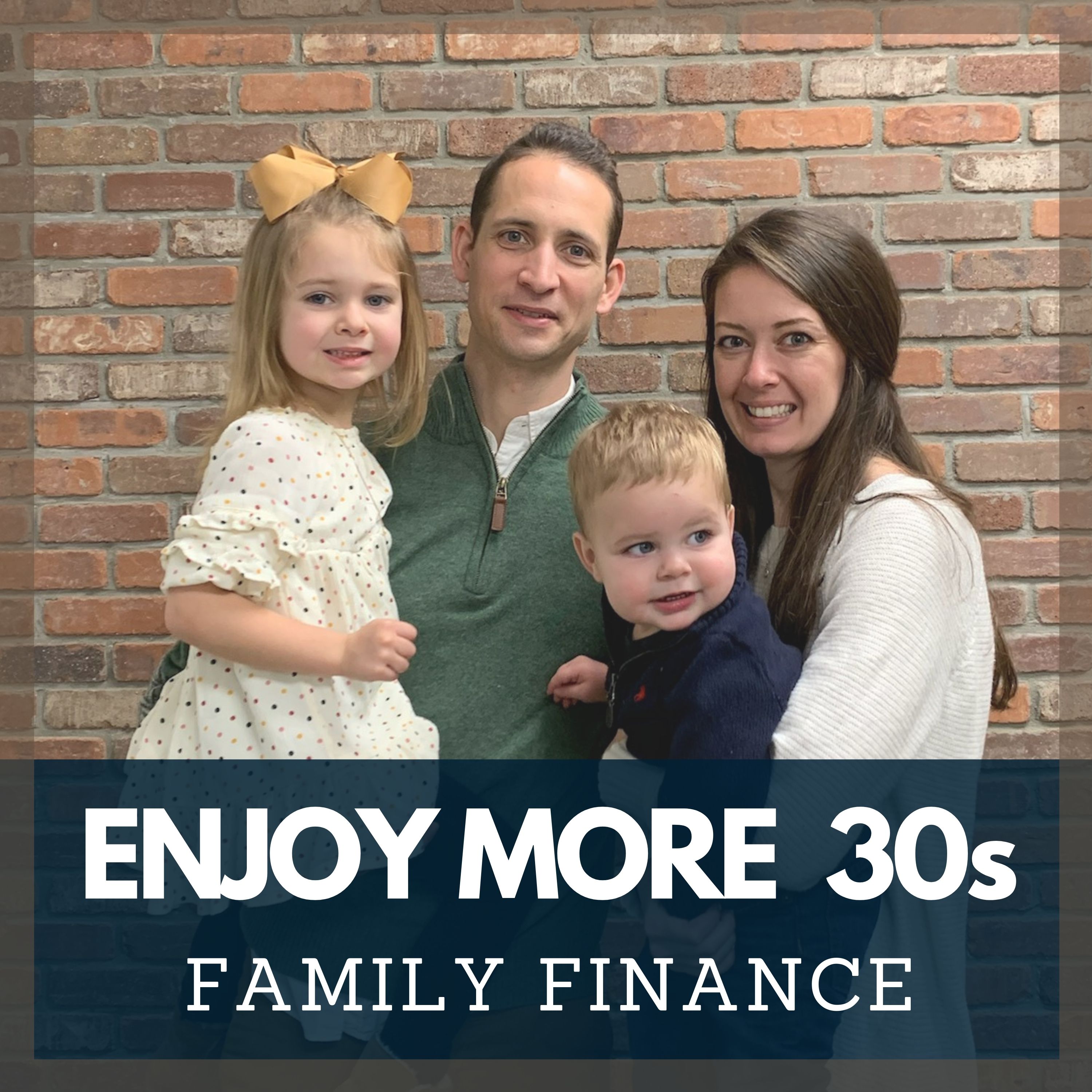Episode 4
You May Already Be a Future Millionaire | Series 1.4
If you started saving early, you may be much farther along than you think!
Quote for the episode: "The really remarkable thing about being young is that we have time on our side- it's the biggest advantage when it comes to investments and where we're projecting.”
Securities offered through TFS Securities, Inc., Advisory Services through TFS Advisory Services, a SEC Registered Investment Advisor Member FINRA / SIPC. TFS Securities, Inc. located at 437 Newman Springs Road, Lincroft, NJ 07738 (732) 758-9300.
Transcript
Welcome to the Enjoy More 30s: Family Finance
Voiceover Audio:podcast, the only podcast dedicated to making life more
Voiceover Audio:enjoyable for young families by hitting on the financial topics
Voiceover Audio:that tend to weigh on us, stress us out and distract our focus
Voiceover Audio:from simply enjoying life.
Joseph Okaly:Hi, and welcome to the fourth episode in the
Joseph Okaly:initial "Your Money Mindset" series here on the Enjoy More
s:Family Finance podcast. Today's episode is titled, "You
s:May Already Be a Future Millionaire". What you need to
s:know about your existing investments, and what you can do
s:about where they are headed today. So packing for little
s:kids when you go on vacation, now in my house at least, Lauren
s:does 99.9% of the packing- she is fantastic. If I were to take
s:.01 percent of the credit for that, I'd probably be
s:overshooting my contribution by a little bit there. My
s:involvement comes really more at the end. We review everything
s:that we're bringing, because I tend to do more of, you know,
s:the carrying of the bags. And I'd rather carry 10 heavy bags
s:and not be missing something that would prevent a child
s:melting down and screaming their heads off in public. However, I
s:also don't want to carry more heavy bags than I need to. Which
s:in my opinion, at least, I think is pretty fair.
s:So what you need to know. Saving enough, sure, of course is the
s:first priority. We want you to hit retirement goals. We want
s:you to hit education goals. We want you to be able to do all
s:these things. But we also don't want you to save too much, as
s:strange as that may sound, because it may limit today's
s:enjoyment. Maybe you want a pool, maybe you want to go to
s:Disney more. There are a million things that I'm sure you want to
s:do that at times you've said 'I can't do that' because I'm
s:saving over here or I want to make sure that I'm on the right
s:track. When we project where your investments are going, it
s:gives you an idea of where you're at, and you may be
s:surprised that you've been doing a better job saving than you've
s:realized. When we sit down with young clients who've been doing
s:a good job saving up to this point, and we look at their
s:projections, we have software that we're putting in their
s:investments, what they're saving, what they're living on-
s:their whole situation. And we can project it out 20 years, 30
s:years, and we can show them exactly what track they're on.
s:And by doing that, it's so freeing for them. It allows them
s:to see what direction they're heading. It allows them to see,
s:"Is there a chance I could retire early?" Does it allow
s:them to see, "Okay, so if I took an extra $200 a month and did
s:something with, or $10,000 one time to do an improvement to my
s:home or a big trip, how would that affect my long term
s:projections?" And this way they know the decisions that they're
s:making, it's an educated decision. This is a much better
s:way to go about it because you know what you're putting where,
s:and how that affects you overall. The really remarkable
s:thing about being young is that we have time on our side- it's
s:the biggest advantage when it comes to investments and where
s:we're projecting. If you're about to retire, wherever you
s:are today, that's pretty much where you're gonna be tomorrow.
s:If you're 30 years out, that makes a world of difference, and
s:it makes the calculation more difficult. But if you do the
s:calculation, it can really help give you an idea of what dir
s:ction you're heading on, and giv you an ability to have a mor
s:educated today for when you re making decisions.
s:So what can you do? The first thing is you want to try to get
s:some idea of what track you're on. You want to discuss with
s:your spouse what you guys are trying to accomplish, and
s:whenever you do figure out what track, how do you want to
s:adjust? Do you want to try to keep saving the amount that
s:you're saving so you can retire early? Are you okay with an age
s:65 or 67 retirement and you'd rather do more stuff today?
s:There's no right or wrong, but once you know the track you're
s:on and that flexibility that you may or may not have, having that
s:conversation with your spouse for what you want to do with
s:that flexibility is super important. So one way to get a
s:very quick idea of kind of where you're headed if you don't have
s:an advisor that can do this kind of projection for you, then you
s:want to really get a quick idea, there are some limited tools
s:that you can use.
s:The rule of 72 is a concept that you can look up online and get
s:more details on, but it gives you a way to kind of know how
s:quickly it's going to take for your money to double. Now using
s:this, let's assume that you have a portfolio that's very well
s:allocated, it's spread out, it's diversified- all terms we're
s:going to go through in later episodes. And a 7% return,
s:excuse me, is a fair estimate that you could be using. That
s:would mean that your money is going to double according to the
s:rule of 72 roughly every 10 years. Let's say that right now
s:you have $150,000 saved up. That means in 10 years from now,
s:you're going to have $300,000 according to this. 20 years from
s:now, you're going to have $600,000 because that 300 would
s:double on itself. That's how you see that power. So in 10 years,
s:that first 10 years, you gained 150. 150 doubled goes to 300, so
s:you gained 150. That next 10 years, so same period of time,
s:but now you gained 300 because that 300 doubled- so now you're
s:at 600. Now this last 10 years here, if we're doing a 30 year
s:evaluation because we're a young family, now you're at 1.2
s:million because that 600 doubled again. That's the power of time.
s:So this rule of 72 can give you some idea of what direction
s:you're heading in based on what you have today. It's not going
s:to be able to build in your contributions or matching
s:amounts, things of that nature. But if you can get some idea of
s:where you're headed, the point is now you can do a better job
s:of making decisions today. Whether you want that to be with
s:an advisor, whether or not you want to do that through
s:yourself, you can look at the rule 72 in more detail. But if
s:you can give yourself some idea of what direction that you're
s:heading, then that is really, really something that can be
s:helpful for you long term.
s:Again, like we talked about earlier in other episodes, we
s:don't want to just be checking boxes. And we don't want to just
s:be doing things to do them because sometimes, or a lot of
s:the time, that doesn't remove the anxiety. You could be
s:putting $10,000, $20,000 a year into your 401(k), but if you
s:have no idea where that's going to end up- will you be able to
s:retire at 50, 55, 65- you're going in a good direction, but
s:you're kind of going in that direction a little bit blind.
s:The more that we can get clarity on what direction we're going
s:into, that allows us to make more educated decisions again
s:today.
s:So again, as a quick summary of what we went through here, you
s:may be on a better path today than what you may realize. May
s:say $150,000 in your account right now, but if you're
s:diversified and spread out well, that could already mean you're
s:on a track for what you have today to be a million dollars or
s:more. Now this may not be enough for you to actually retire on,
s:which may sound weird. Millionaire sounds like, "Oh, I
s:have more than enough." But to last an entire retirement, you
s:may need more than that, depending on what your situation
s:is, obviously. But it gives you an idea of you may be further
s:along than what you think. The second point is, once you do
s:realize this, have that conversation with your spouse.
s:If you do have extra flexibility, for what do we want
s:to do instead? What should we do instead? Maybe one person wants
s:to retire early, another person would rather take more
s:vacations. So it's important to have those conversations if you
s:do have that extra flexibility- what do we want to do with it?
s:As always, thanks for tuning in today. If you enjoy the episode,
s:please make sure to review us on Apple podcasts or wherever you
s:listen. There are literally millions of young American
s:families out there I'm trying to reach and help just like you.
s:Additionally, the next episode coming up in the "Your Money
s:Mindset" series is titled, "18 Summers With Kids". We're going
s:to go through and focus on why it's so important to make the
s:most of our time now. And it's kind of an extension on today's
s:episode- if we do have some extra funds and resources, we
s:want to make sure that we're doing the most with them because
s:the time that we have with our kids is more fleeting than we
s:think. Thanks very much as always for tuning in and looking
s:forward to talking with you again soon.
Voiceover Audio:The conversations on this show are
Voiceover Audio:Joe's opinions and provided for general information purposes
Voiceover Audio:only. They do not constitute accounting, legal tax or other
Voiceover Audio:professional advice for your specific situation. You should
Voiceover Audio:always seek appropriate advice from a financial advisor,
Voiceover Audio:accountant, lawyer or other professional before acting upon
Voiceover Audio:any content or information found here first. Joe is affiliated
Voiceover Audio:with New Horizons Wealth Management LLC, a branch office
Voiceover Audio:of TFS securities Inc, and TFS advisory services and sec
Voiceover Audio:registered investment advisor member FINRA/SIPC.


